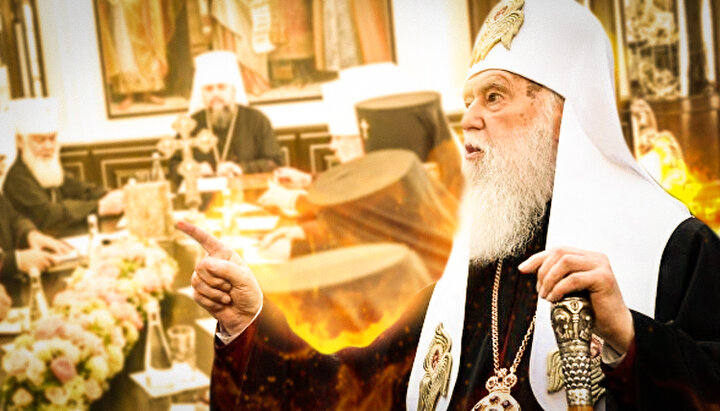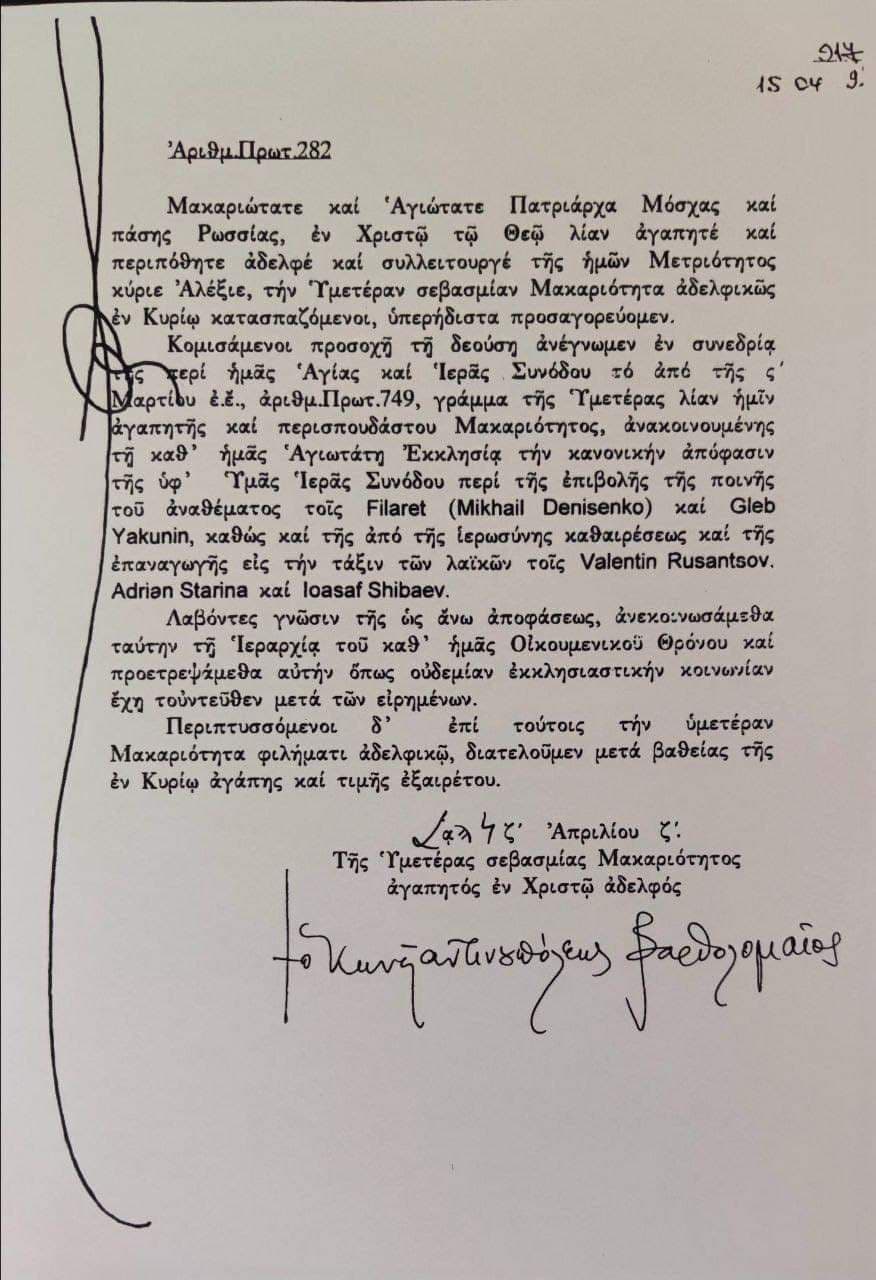Spiders in a jar, or How schismatics banned schismatics

The Synod of the OCU banned from the priesthood the “hierarchs” of the UOC-KP who had been expelled from the Dumenko “episcopate” before. We analyse the situation.
On February 2, 2022, the “holy synod” of the OCU decided to defrock the “hierarchs” of the UOC-KP “ordained” by Filaret Denisenko after June 2019 and banned from the priesthood the three "bishops" who left the OCU together with Filaret with the prospect of being defrocked.
At the same time, the Dumenko followers believe that all those on whom the “Honorary Patriarch” of the OCU laid hands after the revival of the UOC-KP “in fact do not have hierarchal ordination and rank” and appropriated them in a “robbery” way. But they do not consider Filaret himself a robber and do not impose any reprisals on him.
These decisions of the OCU “synod” are so inconsistent and absurd that they should be analyzed in more detail.
The former are non-former?
The decision of the “synod” of the OCU states: “The former Metropolitan Joasaph (Shibaev) of Belgorod and Oboyan, the former Bishop of Belgorod-Dnistrovsky Filaret (Panku) and the former Bishop Peter (Moskalev) of Valuysk were summoned to the court of the Holy Synod of the Orthodox Church of Ukraine or gross violation of the canonical order, participation in illegal meetings and the so-called hierarchal ordinations in Kyiv on charges for which they are subject to defrocking. If absent, they are to be tried in absentia.”
In the Orthodox Church, the word "former" is used in relation to a clergyman only if he has been defrocked. This was not done in the OCU in relation to the persons in question. But there was something else, which had nothing to do with canon law.
As early as June 24, 2019, the “holy synod” of the Dumenkov organization "expelled from the episcopate" of the OCU Joasaph Shibaev, Filaret Panka and Peter Moskalev “for active participation in actions aimed at inciting confrontation in the church environment, conscious opposition to conciliar decisions, violation of the 34th Apostolic Canon, participation in the implementation of ordinations in a foreign diocese contrary to the Statute and canonical rules".
What canonical norm is this – expulsion from the episcopate? Where, in what canons is it written? And does the exclusion from the episcopate allow us to consider the excluded bishops as former ones? There is no such thing in Orthodox canon law. Only the bishop who was defrocked by the Holy Synod or the Council of Bishops can be considered a former one. But not the one who was "expelled from the episcopate".
What canonical norm is this – expulsion from the episcopate? Where, in what canons is it written?
In other words, Dumenko neither banned these persons from ministry nor defrocked them but expelled them, just as an offended woman drives out a guilty cohabitant. Therefore, the word "former" in this case has the same meaning as in the situation of a quarrelling couple, when the parties refer to their unsuccessful partners as "my ex".
But by what right are they judged if, at least since June 2019, they have nothing to do with the leadership of the OCU? Again, we will hardly get an answer to this question.
The absurdity of the situation is that Dumenko could not even expel the guilty "bishops" for the simple reason that they could not be members of the OCU according to the Tomos provisions.
The text of the document says that the OCU cannot have parishes or, moreover, dioceses, outside of Ukraine. All overseas parishes and dioceses of the UOC, according to the document issued by the Phanar in 2019, are transferred to the jurisdiction of the Patriarchate of Constantinople. And Shibayev's diocese, like Panku's, is outside Ukraine's borders (in Russia and Moldova, respectively). This means that neither the former nor the latter "bishop" ever belonged to the "episcopate of the OCU after the Tomos was granted, which, in fact, Shibayev reminded the OCU "synod" of back in 2019. According to the 4th clause of the OCU's Statute, the jurisdiction of this structure extends only to the territory of Ukraine, and since he and Peter Moskalev are outside the territory of Ukraine, "it means outside the jurisdiction of the OCU”.
Already now, commenting on the decision of the "synod" about his "ban", Shibayev stressed that he had never been a member of Dumenko's "gang" and noted that "the common sense, not to mention the moral side and the Canons, is alien and vague to them". "A bunch of moral cripples can behave just like a crazy, mean, and deceitful gang. This is what happens when ignoramuses and immoral persons are at the helm of what they call a church," Shibayev wrote on his Facebook.
Ban of the banned
In his publication, Joasaph addressed Dumenko with a very interesting phrase. "Since you didn’t give me that dignity, it’s not for you to remove it," wrote Shibaev and added, "First, you yourselves need to be defrocked for the grossest violation of not only the Canons of the Church but also the very moral norms of the Law of God".
There is another nuance here. The same Joasaph Shibaev has already been found defrocked, and not among the schismatics. This was announced by... Patriarch Bartholomew himself.
In a letter to Patriarch Alexy in April 1997, he wrote: "Regarding the decision of the Synod of the Russian Orthodox Church to anathematize Michael Denisenko and defrock and relegate Joasaph Shibaev to the laity <...>. We reported it to the hierarchy of our Ecumenical See and asked it not to have any ecclesiastical communion with these persons.”

It turns out that the layman Dumenko wants to defrock the layman Shibaev. This is what their “showdowns” look like from the point of view of the Church.
It turns out that the layman Dumenko wants to defrock the layman Shibaev.
“Extreme oeconomy” to Filaret
Dumenko and his comrades apply harsh language to the people whom Filaret ordained, to his associates but not to Filaret himself. The “synod” of the OCU recalled that it had previously forbidden Filaret “to convene and lead meetings to resolve issues of church administration, to carry out ordinations, etc.” Nevertheless, the Dumenko adherents decided “solely out of respect for the previous merits” of Filaret and “considering his age and state of health” to apply “extreme oeconomy without taking tougher measures of canonical response to the violations committed by him”.
The only thing that the OCU decided to do was to call Filaret not “His Holiness”, but “His Grace” (a title of a bishop). Also, his photo from the list of bishops was moved from the first place (immediately following Dumenko) to the last but one position with the caption “Honorary Patriarch Emeritus”. Needless to say, the history of Orthodoxy has not known such formulations.
Another thing is unclear - on the basis of what does the "synod" of the OCU not recognize the “holy orders” of the UOC-KP "priests" ordained by Filaret after 2019? After all, if Filaret is not a schismatic (no one declared him such) but an “honorary patriarch”, then by what right are the “ordinations” performed by him declared invalid?
And the most important question is: why do the “hierarchs” “ordained” by him AFTER 2019 do not have “episcopal dignity”, while those “ordained” BEFORE 2019 have such dignity? And here it goes about Dumenko, Zoria and the vast majority of other "hierarchs" of the OCU whom Filaret "ordained".
It is no coincidence that the same question is asked by the Greek resource: “Indeed, why are Filaret’s ordinations invalid from June 2019, and not from June 1992, when he was deposed and excommunicated by the Synod of the Russian Church?”
The Greeks stress that the Dumenko associates are at an impasse with the "Filaret problem" because they understand perfectly well that "by deposing Filaret a second time, they will condemn themselves". And it is precisely for this reason that “they do not touch their founder and decided to forgive him ‘by oeconomy’, without applying tougher canonical measures to the violations committed by him…”.
The conclusion that the Greeks came to is obvious: “The self-appointed, excommunicated and anathematized, who make up the so-called ‘synod’ of the OCU, not only survived the collapse of their schismatic structure but are also completely ignorant in matters of Orthodox ecclesiology.” We cannot but agree with that.
Anathema of the anathematized
No less strange is the request of the "synod" of the OCU addressed to the Greek Orthodox Church – to anathematize the Greek Old Calendarists who have defected to Filaret.
Here we should remind Dumenko's "synodals" that anathema is not a curse but a statement of the fact that a person who claims or believes to be affiliated with the Church, in fact, does not belong to the Orthodox Church. In this sense, for example, one can anathematize Tolstoy but not Gorky. Because Tolstoy (at least initially) considered himself an Orthodox Christian, while Gorky did not. In other words, one cannot anathematize someone who does not belong to the Church.
In addition, it must be emphasized here that:
- The Greek Old Calendarists do not consider themselves part of the Orthodox Church of Greece;
- The Greek Church considers them schismatics, which means they have fallen away from the Church;
- The Old Calendarists anathematized both one another (they have different currents and different "synods") and everyone who disagrees with them.
So, what anathema is the OCU asking for? After all, we repeat once again, it is impossible to anathematize those who are already outside the Church. Let us quote the opinion of the Greek resource "Vimaorthodoxias":
"The ‘synod’ of the OCU asks ‘the Canonical Orthodox Church of Greece to excommunicate and anathematize whom? Those who do not belong to its ranks, who do not have communion with it, and who, being Old Calendarists, are, of course, schismatics and therefore anathematized’."
Conclusions
As we can see, the decisions of the "synod" of the OCU contradict both logic and common sense, as well as the principles of canon law. No wonder. Because the structure that appeared as a result of the violation of the canons of the Orthodox Church is simply physically incapable of respecting these same canons. And not because it doesn’t know them (although this is a fact), but because the canons are contrary to its inner nature, which obeys only the "father of lies" and chaos – the devil.
The only problem is that its poison can infect all those who come into communion with this organisation.











